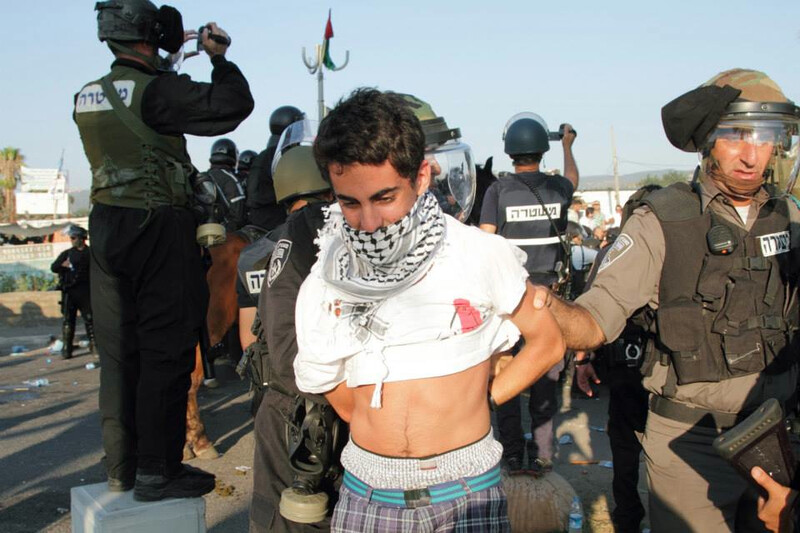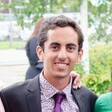8 August 2013

The writer, Jalal Abukhater, is arrested by Israeli police during the 1 August protest at Wadi Ara.
On 1 August, I was among 18 people arrested at a peaceful protest against the Prawer Plan – Israel’s latest scheme to forcibly remove 40,000 Bedouins from their homes in order to take their land in the Naqab (Negev) region.
The Israeli police violence against us sheds light once again on the real meaning of Israeli “democracy.”
Last week’s protests were only the latest actions, following large protests against the Prawer Plan on 15 July, which Israeli police also met with violence.
Indeed, in Israel, a citizen’s right to freedom of expression and protest depends on his or her ethnic and religious background. If those protesting happen to be non-Jews – Palestinian citizens of Israel – those rights simply vanish.
Tear gas and beatings
There were two major protests against the Prawer Plan on 1 August, one in the south, and one in Wadi Ara, in the north of the country. Both demonstrations aimed to reach major road intersections in order to gain maximum visibility.
I was present at the demonstration in Wadi Ara. The demonstration was meant to march from the entrance of the town of Arara and block the Ara-Arara intersection at Wadi Ara road (Road 65).
As soon as the protestors started marching towards Road 65, we were met with hundreds of riot police, a bunch of mounted units and a rain of stun grenades and tear gas. Beatings and arbitrary arrests followed.
Breaking out of “ghettos”
The Wadi Ara march had more than 750 people who had come from towns across the center of present-day Israel, the coast and the Galilee, as well as Jerusalem.
In recent years, demonstrations have been limited to the centers of these towns, where most Palestinian citizens of Israel are concentrated.
People believed it was necessary to demonstrate outside those towns – or ghettos as some organizers put it – for the protests to become more visible and effective.
The protests were perfectly legal and every demonstrator had the right to be there, yet the demonstration was violently suppressed by the Israeli police.
But, you might ask, wouldn’t police intervene in any protest that tried to block a public highway? Well, the depends on who the protestors are.
Israeli Jews block roads without interference
Less than a month ago in Tel Aviv, about four thousand “social justice” protestors took to the streets to mark the second anniversary of the overwhelmingly Israeli Jewish “J14” protest movement.
As Haggai Matar reported for +972, about a thousand demonstrators marched onto Ayalon highway in central Tel Aviv, where “For about an hour they marched on the southbound lanes, unstopped by police, and kept on chanting against the government’s austerity measures and neo-liberal capitalist agenda.”
In Wadi Ara, when about 50 protestors managed to get past the riot police and march onto the highway, they were met with mounted police units trampling over them, as well as riot police shoving them on the pavements, beating and arresting them.
Both groups are citizens of Israel, but the response to the protests depended on whether they were predominantly Jewish or Arab.
Bogus charges
As one of those arrested, I can say that we were arrested for either chanting anti-Prawer Plan slogans or for taking part in the demonstration on the highway.
Yet the charges varied between beating police, obstructing police work, and even throwing stones. Eight of us were released that night, but the other ten, including me, were held overnight for a court hearing the next morning.
Many of those held overnight were fasting for Ramadan, but were provided with nothing but a cup of water, which meant that they went two whole days without food.
The next morning, even though the police were insisting on the bogus charges, everyone was cleared by the court as evidence was put forward proving our innocence.
Some of the activists released from the 24-hour detention headed to hospital afterwards to receive treatment for the injuries they received during arrest.
Several showed the court bruises and even bloodstains caused by the police beatings.
A duty to protest
The police kept trying to argue, during individual interrogations and in court, that the protest was illegal.
In the occupied West Bank, almost all Palestinian demonstrations are “defined as ‘illegal’ under Israeli military law, which states that any gathering of 10 or more people requires a permit.”
Wadi Ara, however, is not in the occupied West Bank. The violent response of the Israeli police is one more piece of evidence that Israel doesn’t treat its Palestinians citizens the same way it treats Jewish citizens. Rather, it deals with them as enemies of the state even though they hold citizenship.
The Prawer ethnic cleansing plan is racist and vile. Tens of thousands are threatened with dispossession and expulsion from their homes.
This is a continuation of the Nakba and demonstrating against it is the duty of Palestinians all over Palestine, not least because the land grab will not stop there.
People must say ethnic cleansing will not pass, and they have every right to do so.
Amnesty, HRW tell Israel to respect right to protest
Both Amnesty International and Human Rights Watch have condemned Israel’s “excessive force,” against the anti-Prawer Plan protests.
Philip Luther, Amnesty International’s Middle East and Northern Africa director said, on 30 July, the day before the latest protests, “The use of excessive force by the police during the 15 July marches sent a dangerous signal about how little Israel respects the rights of its Palestinian citizens. The Israeli authorities must ensure that peaceful demonstrators are able to express their opposition to the plan free from intimidation or violence.”
As we learned first hand, Israel was not listening.






Comments
Zionist police brutality
Permalink Eli replied on
As a religious jew who protested digging up graves and sabbath desecration in Jerusalem, I can tell you that police brutality is not limited to Arabs only. True, you guys get it worse, (much worse) but the cops in Jerusalem were pretty brutal too. As far as I can tell the difference is that by us they start with nightsticks and move up to teargas and by you they start with teargas and move up to rubber bullets.
And I was arrested on false charges too.
Numbers count
Permalink Harry replied on
It's entirely in character for police to attack a protest of 50 but decline to confront a 1000 strong march. That said, I'm confident that racism was an important motivation in this case, as in many others. As they always say, 'Israel is a Jewish democracy - democratic for Jews and Jewish for Arabs'.
Numbers count
Permalink Jalal Abukhater replied on
Yes, that could be true if this was the case. But the protest wasn’t of 50 people. The protest was of almost a thousand, who all were attacked equally by the police for attempting to march to the intersection. The group of 50 (or less) that I’ve mentioned is a group who managed to get past the police and reach the intersection but were handled with force as well.
Numbers count
Permalink Harry replied on
Thanks for clarifying that.